Related Research Articles
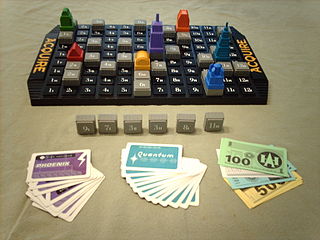
Acquire is a board game published by 3M in 1964 that involves multi-player mergers and acquisitions. It was one of the most popular games in the 3M Bookshelf games series published in the 1960s, and the only one still published in the United States.
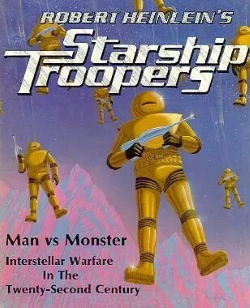
Starship Troopers is a board wargame by Avalon Hill based on the 1959 novel of the same name by Robert A. Heinlein. It was originally released in 1976 and designed by Randall C. Reed. Twenty years later, Avalon Hill redesigned and re-released a "movie" version in 1997 to coincide with the movie's release.
Games World of Puzzles is an American games and puzzle magazine. Originally the merger of two other puzzle magazines spun off from its parent publication Games magazine in the early 1990s, Games World of Puzzles was reunited with Games in October 2014.

Mike Selinker is an American game designer, puzzle maker, and the founder and president of Lone Shark Games.
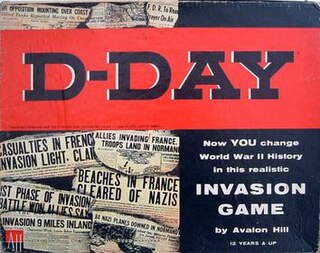
D-Day is a board wargame published by Avalon Hill in 1961 that simulates the six months of the European Campaign of World War II from the Normandy Invasion to the crossing of the Rhine. It was the first wargame to feature the now ubiquitous hex grid map and cardboard counters, and was revised and re-released in 1962, 1965, 1971, 1977 and 1991.

Alexander the Great is a board wargame first published by Guidon Games in 1971 that simulates the Battle of Arbela in 331 BCE, also known as the Battle of Gaugamela. A revised edition was published by Avalon Hill in 1974. Both editions of the game were notable for having what one critic described as "one of the ugliest maps ever to curse a war game."

Tactics is a board wargame published in 1954 by Avalon Hill as the company's first product. Although primitive by modern standards, it and its sequel, Tactics II, signalled the birth of modern board wargaming for the commercial market. Tactics is generally credited as being the first commercially successful board wargame.
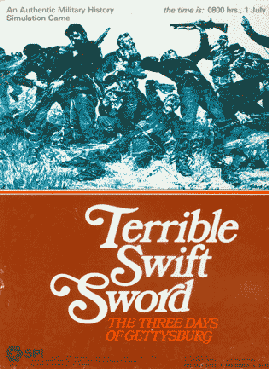
Terrible Swift Sword: Battle of Gettysburg Game is a grand tactical regimental level board wargame published by Simulations Publications, Inc. (SPI) in 1976 that simulates the Battle of Gettysburg during the American Civil War. A second edition was published by TSR in 1986.
Image is a trivia card game developed Henry Szwarce and published by 3M in 1971. The object of the game is to put together cards that represent a historical or fictional character.

Phoenix was a magazine primarily focussed on board wargames. It was published in the UK in the 1970s and 1980s by Simpubs Ltd., the British subsidiary of American game company Simulations Publications, Inc. (SPI).
Bridgette is a two-player bridge game that has been popular since 1970. It features a 55-card deck: the regular pack of 52 cards plus three extra cards called "colons". These special cards separate the pack into three groups: aces (A) with the grand colon, picture cards (JQK) with the royal colon, and spot cards (2—10) with the common colon. On an opponent's lead, the colon from the corresponding group may be played instead of following suit. The colon so played loses, but forces the opponent to lead one of the other three suits to the next trick. The colons' skill is quite subtle and the addition of these cards makes up for there being only two cards to a trick, instead of four cards as in the game of standard bridge.

Dreadnought, subtitled "Surface Combat in the Battleship Era, 1906-45", is a naval board wargame published Simulations Publications, Inc. (SPI) in 1975.
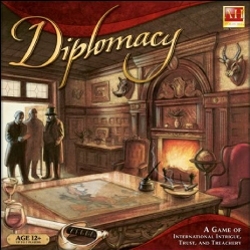
Diplomacy is a strategic board game created by Allan B. Calhamer in 1954 and released commercially in the United States in 1959. Its main distinctions from most board wargames are its negotiation phases and the absence of dice and other game elements that produce random effects. Set in Europe in the years leading to the Great War, Diplomacy is played by two to seven players, each controlling the armed forces of a major European power. Each player aims to move their few starting units and defeat those of others to win possession of a majority of strategic cities and provinces marked as "supply centers" on the map; these supply centers allow players who control them to produce more units. Following each round of player negotiations, each player can issue attack and support orders, which are then executed during the movement phase. A player takes control of a province when the number of provinces that are given orders to support the attacking province exceeds the number of provinces given orders to support the defending province.
Games & Puzzles was a magazine about games and puzzles. The magazine was first published in May 1972 by Edu-Games (UK) Ltd. The first editor was Graeme Levin who recruited a variety of games and puzzles experts as writers and consultant editors including Darryl Francis, David Parlett, David Pritchard, Don Turnbull, Eric Solomon, Gyles Brandreth, Nick Palmer, R. C. Bell, Richard Sharp, Sid Sackson and Tony Buzan. This gave it a good reputation; for example, Popular Computing wrote "Quite simply, Games & Puzzles Magazine is unique. There is no other publication quite like it anywhere in the world." Its headquarters was in London.
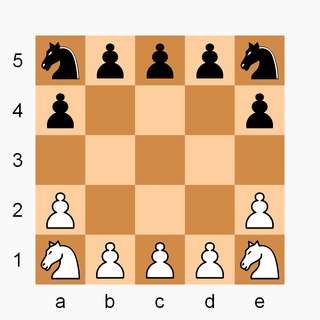
Apocalypse is a chess variant invented by C. S. Elliott in 1976. Each player starts with two horsemen and five footmen on a 5×5 board. The two sides make their moves simultaneously.

Outreach, subtitled "The Conquest of the Galaxy, 3000 AD", is a science fiction board wargame published by SPI in 1976 that simulates galactic empire building.

StarSoldier is a science fiction board wargame published by Simulations Publications, Inc. (SPI) in 1977.

Decline and Fall of the Roman Empire, originally titled Decline and Fall: The Game of the Barbarian Invasions, is a board game published by Wargames Research Group (WRG) in 1972 in which 4th-century Rome struggles against invading barbarians.

7th Cavalry is a board wargame published by Attack Wargaming Association (AWA) in 1976 that simulates the Battle of Little Big Horn. Published on the centenary of the battle, the game had two other rival games about the same battle introduced at the same games fair, and as a result, none of the games sold well. In addition, critics found this game's rules too simple, and not well written.
Track is a board game published by Smurfit Games in 1975.
References
- ↑ Games Publications (1978-01-01). GAMES Magazine #3. p. 48.
- ↑ Games and Puzzles 1976-09: Iss 52. Internet Archive. A H C Publications. 1976. p. 21.
{{cite book}}: CS1 maint: others (link)